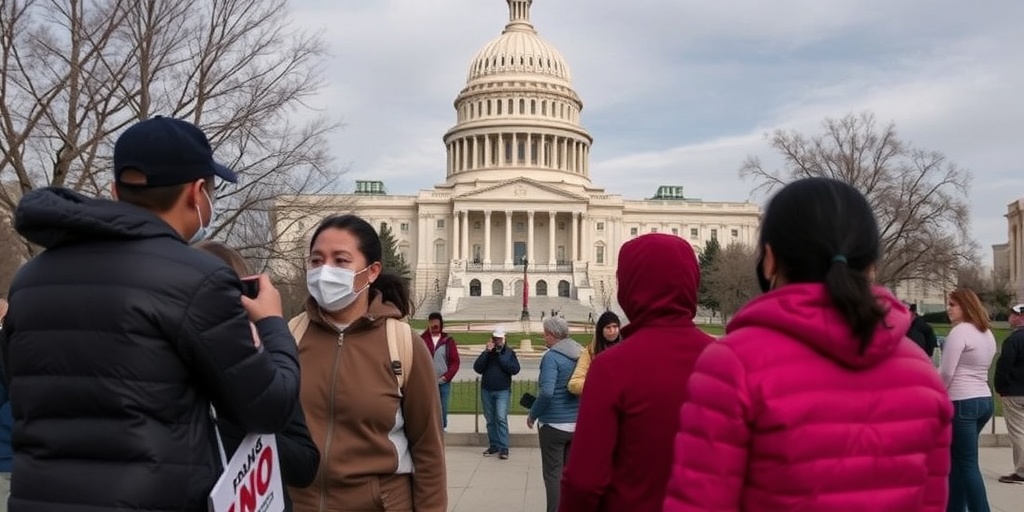Now Reading: Senate Advances Bill to Deport Criminal Migrants
-
01
Senate Advances Bill to Deport Criminal Migrants
Senate Advances Bill to Deport Criminal Migrants

Senate Advances Controversial Immigration Legislation with Bipartisan Support
On Friday, the U.S. Senate made significant progress towards enacting new immigration legislation that would mandate the detention and deportation of undocumented immigrants accused of minor crimes or those who assault police officers. This move came after a surprising show of bipartisan support, with several Democratic senators breaking ranks with their party to back the proposal.
The legislation, which passed the House of Representatives with bipartisan backing just a week prior, received a crucial boost during a test vote where it secured a 61 to 35 majority. To advance to a final vote, ten Democrats aligned with Republicans, ensuring that the measure surpassed the 60-vote threshold required to avoid a filibuster. This decisive vote enhances the likelihood that the legislation will reach President-elect Donald J. Trump’s desk for his signature shortly after he is inaugurated on Monday.
Although the Senate must still approve the measure in a scheduled vote on Monday afternoon—just hours after Trump takes office—the momentum appears firmly in favor of the bill. The Senate’s swift action follows days of intense debate, revealing deep divisions among Democrats regarding immigration policy, particularly in light of the party’s electoral setbacks in the previous November elections. This legislation marks the initial legislative action by Republicans as part of a broader agenda to tighten immigration controls and ramp up deportations, a key promise made by Trump during his campaign.
Named after Laken Riley, a 22-year-old nursing student from Georgia who was tragically killed last year by an undocumented migrant from Venezuela—who had prior arrests for shoplifting but had not been detained—the legislation is positioned as part of the GOP’s commitment to border security. Trump’s inauguration is expected to solidify Republican control of the government, allowing them to revive several border-related bills that had previously stalled in Congress.
This new immigration bill seeks to broaden the scope of detainable offenses for unauthorized immigrants, including those arrested for crimes such as burglary, theft, larceny, and shoplifting. Notably, the Senate added charges related to assaulting a police officer to the list, a move that underscores the bill’s punitive focus. Republican Senator Katie Britt of Alabama articulated the party’s justification for supporting the bill, claiming that the outcome of the 2024 elections indicated a public mandate for stricter immigration policies and enhanced border security. “It is our duty to turn their cries into action,” she stated, reinforcing the notion that lawmakers must respond to constituent concerns about safety and security.
Conversely, dissenting voices from the Democratic side have raised serious concerns regarding the implications of the new legislation. Critics argue that it could jeopardize due process rights for migrants who have not been convicted of any crimes and may squander limited federal resources that could be better utilized to target individuals who pose more significant threats to public safety. Senator Patty Murray, a Democrat from Washington, expressed her discontent, highlighting her apprehensions about potential abuses of the legislation and urging her colleagues to advocate for a more humane and effective approach to immigration reform.
Despite these concerns, several Democratic senators chose to support the bill, particularly those facing re-election in 2026 or representing states that Trump carried in the last election. Senators such as Jon Ossoff of Georgia, Gary Peters of Michigan, Jeanne Shaheen of New Hampshire, and Mark Warner of Virginia were among those who voted in favor, as were others from battleground states. The bipartisan support indicates a complex political calculus, as some senators may be aligning with public sentiment in their respective states.
An additional contentious provision in the legislation empowers state attorneys general to sue the federal attorney general or the Secretary of Homeland Security if an undocumented immigrant commits a crime that harms state residents. Immigration advocates have criticized this aspect as a veiled attempt to allow conservative state leaders to impose their immigration enforcement policies, further complicating the federal immigration landscape. This concern was highlighted when Senate Republicans rejected an amendment from Senator Chris Coons, a Democrat from Delaware, which sought to remove this controversial clause.
As the Senate prepares for a final vote on this pivotal legislation, it is clear that the immigration debate will remain a contentious issue in American politics, reflecting broader national conversations about safety, security, and fairness in the immigration system. As this bill moves closer to becoming law, its ramifications for immigrants and communities across the country will undoubtedly be profound and far-reaching.
Stay Informed With the Latest & Most Important News
Previous Post
Next Post
-
 01New technology breakthrough has everyone talking right now
01New technology breakthrough has everyone talking right now -
 02Unbelievable life hack everyone needs to try today
02Unbelievable life hack everyone needs to try today -
 03Fascinating discovery found buried deep beneath the ocean
03Fascinating discovery found buried deep beneath the ocean -
 04Man invents genius device that solves everyday problems
04Man invents genius device that solves everyday problems -
 05Shocking discovery that changes what we know forever
05Shocking discovery that changes what we know forever -
 06Internet goes wild over celebrity’s unexpected fashion choice
06Internet goes wild over celebrity’s unexpected fashion choice -
 07Rare animal sighting stuns scientists and wildlife lovers
07Rare animal sighting stuns scientists and wildlife lovers





















